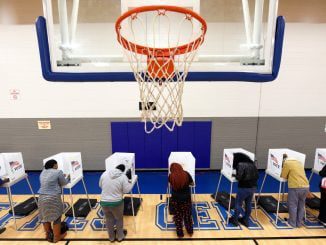
After the first Democratic debate in June, Sen. Kamala Harris was on top of the world.
The 2020 presidential candidate from California had bested longtime frontrunner Joe Biden during a heated back and forth over his remarks about busing and working with segregationist senators in the 1970s to get things done. As a result, her polling numbers grew and her campaign fundraising received a significant boost.
The MSM and liberal political commentators began treating Harris like the invincible presidential candidate.
But in politics, as in all things, glory can be fleeting.
Two short weeks after the debate, her polling numbers started falling. The media was pressing her on her continued racially tinged attacks on Biden. The answers she gave weren’t adding up.
By the time of the second debate at the end of July, her campaign was in a freefall. Support from black and female voters dropped dramatically. That support cratered even more after her poor debate performance, which saw lower-tier candidate Rep. Tulsi Gabbard from Hawaii get the best of Harris in an eye-opening exchange over her troubling criminal justice reform record as California’s attorney general.
Post-debate polling showed how badly the Harris campaign had been damaged in the span of four weeks. Where she had been at 27% among black supporters in early July, she was down to 1% in early August. Where she had been at 24% among female supporters at the start of July, she was down to 7% in early August.
August and September haven’t been any kinder to Harris. A national poll taken the first week of September put Harris just 3 points ahead of Gabbard, whose campaign numbers she had mocked after Gabbard had one-upped her at the second debate.
A more recent poll shows Harris in fifth place — in her home state of California. No primary candidate has ever gone on to win their party’s nomination after failing to win their own state.
What has caused Harris to fall out of favor with Democratic voters? A combination of things.
As it turns out, black voters were turned off by her repeated attacks on Biden. The broadsides did not sit well with those who remember — and who have been frequently reminded of — his eight years as President Obama’s vice president.
In addition to that, a report from national news outlet Bloomberg quoted several California Democrats suggesting Harris was too prone to flip-flopping on important issues. “Either you know what issues you support and you have the courage to stand up for them or you don’t,” noted one female voter.
The beneficiaries of Harris’ decline have been Warren most notably and, to a lesser extent, Biden and Sen. Bernie Sanders. A July analysis done by McClatchy DC noted that both Warren and Harris draw their “support from the party’s more affluent, college-educated wing — particularly women” and that Warren more so than Harris was winning over women voters.
Recent polls also show voters are viewing Warren as more “electable” than they did a few months ago, which is a contributing factor to why her numbers are rising. Electability has been a top requirement from Democratic voters since the 2020 campaign season kicked into high gear at the first of the year.
All of this just goes to show that when it comes right down to it, while Democratic party leaders and figureheads put a strong emphasis on identity politics when it comes to picking candidates, their rank and file voters are putting other factors first.
Priorities like who they feel can win the election, who they believe will best represent them in office, who they think will stand firm on the issues that matter most to them.
With this information in mind, Harris is having to recalibrate her campaign. Unfortunately for her, it may be too late.
Stacey Matthews is a veteran blogger who has also written under the pseudonym Sister Toldjah and is a regular contributor to Red State and Legal Insurrection.



